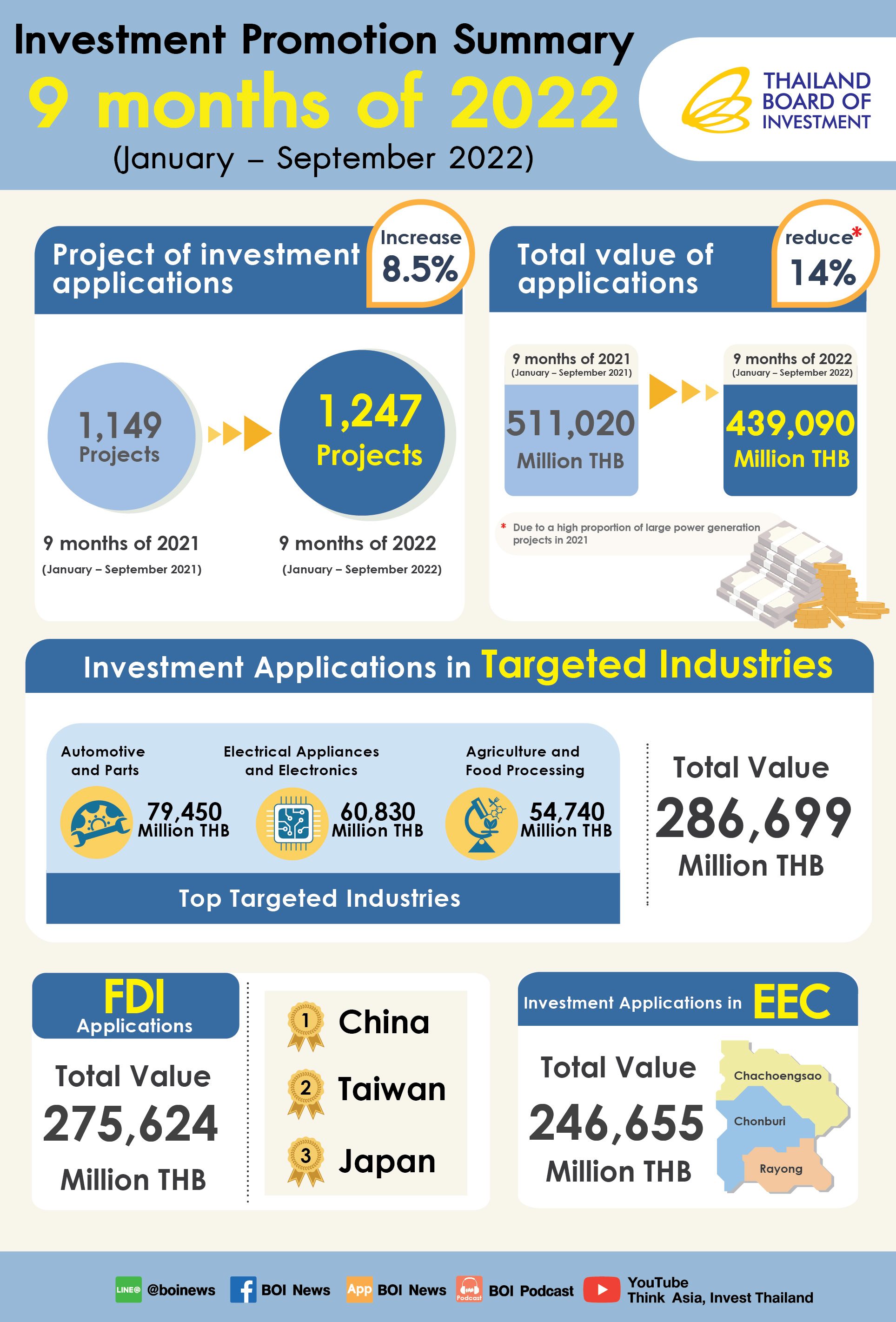
The Thailand Board of Investment (BOI) at a board meeting held last week approved the framework of its new Investment Promotion Strategy for the next five years, which will focus on entering the new economy era by encouraging technological advancement, the transition to green and smart Industries, talent development, as well as creativity and innovation, to strengthen the country’s status as a regional hub for business, trade and logistics.
The new investment promotion strategy (2023-2027) sets out to promote investment to restructure the country’s economy around three core concepts, namely 1) innovation, technology, and creativity, 2) competitiveness and the ability to adapt quickly, and 3) inclusiveness, taking into account environmental and social sustainability.
“In view of the challenging, volatile and highly competitive global environment, the BOI will stay ahead of changes and keep promoting investment in a way that achieves concrete results, helping to lead Thailand into the new economy,” Mr. Narit Therdsteerasukdi told reporters during his first press conference since he took office as Secretary General of the BOI on October 3. “To reach that objective, the BOI will broaden its role from that of a ‘Promoter’ providing tax and non-tax benefits, to focus on becoming an ‘Integrator’ of investment support tools, a ‘Facilitator’ providing services, and a ‘Connector’ linking industries to create more business opportunities.”
To implement the strategy and its vision of the new economy, the BOI will articulate its investment promotion policies around seven pillars:
1) The upgrade of existing industries, in parallel with the building of new industries in which Thailand has a high potential, and an overall strengthening of the supply chain
2) The acceleration of the industrial transition to green and smart industries through investments in automation, digital adoption and decarbonization
3) The promotion of Thailand as a business center, and an international trade and investment gateway for the region
4) The strengthening of SMEs and startups, ensuring they are connected to the global market and supply chain
5) The promotion of investments in the different regions of Thailand that fits the potential of each area and enables inclusive growth
6) The promotion of investments that will promote community and society development
7) The promotion of Thailand’s overseas investment to expand business opportunities for Thai companies
January-September Investment Applications
The board also acknowledged the investment pledges filed during the first nine months of 2022.
From January to September 2022, foreign and local investors filed with the BOI a total of 1,247 applications for investment promotion, worth a combined 439.1 billion Baht (US$ 11.6 billion), Mr. Narit said.
While the number of applications rose 8.5% when compared to the 1,149 projects seen in the first nine months of 2021, the combined value fell 14.1%, from 511 billion Baht, reflecting a smaller average project size.
Thailand’s Eastern Economic Corridor (EEC) area saw 376 projects applying for promotion, representing a combined investment value of 246.7 billion baht, or 56% of the total value of applications in the first nine months, Mr. Narit said. Most are investments in Rayong and Chonburi provinces.
Foreign direct investment (FDI) applications decreased 25% from the year earlier period to 275.6 billion Baht
The main source of FDI applications in the first nine months was China with 45 billion Baht, followed by Taiwan (39.3 billion Baht), Japan (37.6 billion Baht), the U.S. (34.3 billion Baht), and Hong Kong (26.3 billion Baht).
During the first nine months, FDI applications data for China, Hong Kong and Taiwan all included investments in the manufacturing of new electric vehicles (EV) and parts. Major EV investments announced in Thailand this year involve plants by BYD, whose investment is coming through its Hong Kong-based unit, and Foxconn.
Over the 9 months to September, the BOI has issued promotion certificates to 1,101 projects, an increase of 17% from the year earlier period. The combined investment value of the certificates amounted to 357.6 billion baht, an increase of 57%, Mr. Narit said.
“The promotion certificate statistics, the closest data we have to actual investment, are sending a clear signal that over the next one to two years there will be a significant increase in actual investment flows,” Mr. Narit said.
Further details of the policies and sector-specific incentive packages will be presented to the board and announced in coming weeks, Mr. Narit said.

